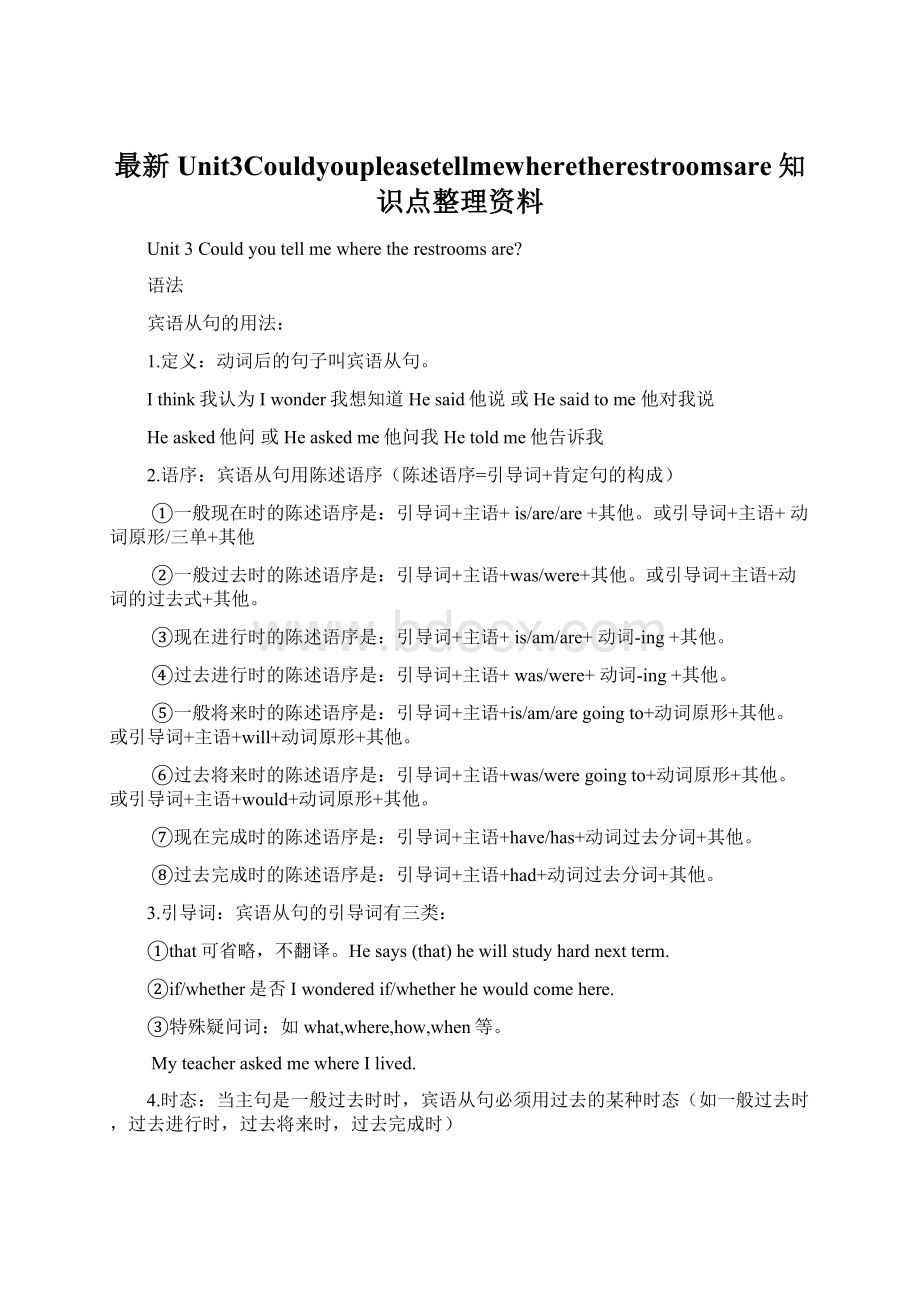最新Unit3Couldyoupleasetellmewheretherestroomsare知识点整理资料Word文档格式.docx
《最新Unit3Couldyoupleasetellmewheretherestroomsare知识点整理资料Word文档格式.docx》由会员分享,可在线阅读,更多相关《最新Unit3Couldyoupleasetellmewheretherestroomsare知识点整理资料Word文档格式.docx(12页珍藏版)》请在冰豆网上搜索。

引导词+主语+was/were+其他。
或引导词+主语+动词的过去式+其他。
③现在进行时的陈述语序是:
引导词+主语+is/am/are+动词-ing+其他。
④过去进行时的陈述语序是:
引导词+主语+was/were+动词-ing+其他。
⑤一般将来时的陈述语序是:
引导词+主语+is/am/aregoingto+动词原形+其他。
或引导词+主语+will+动词原形+其他。
⑥过去将来时的陈述语序是:
引导词+主语+was/weregoingto+动词原形+其他。
或引导词+主语+would+动词原形+其他。
⑦现在完成时的陈述语序是:
引导词+主语+have/has+动词过去分词+其他。
⑧过去完成时的陈述语序是:
引导词+主语+had+动词过去分词+其他。
3.引导词:
宾语从句的引导词有三类:
①that可省略,不翻译。
Hesays(that)hewillstudyhardnextterm.
②if/whether是否Iwonderedif/whetherhewouldcomehere.
③特殊疑问词:
如what,where,how,when等。
MyteacheraskedmewhereIlived.
4.时态:
当主句是一般过去时时,宾语从句必须用过去的某种时态(如一般过去时,过去进行时,过去将来时,过去完成时)
①Hedoeshishomeworkeveryday.→Hismothersaidthathedidhishomeworkeveryday.
②Heislisteningtotapes.→Hismothersaidthathewaslisteningtotapes.
③HewillreturnherenextFriday.→HismothersaidthathewouldreturnherethenextFriday.
④Hehasalreadyfinishedreadingthebook.→Hismothersaidthathehadalreadyfinishedreadingthebook.
注意:
当宾语从句是客观事实或普遍真理时,永远都用一般现在时。
Theearthgoesaroundthesun.→Theteachertoldusthattheearthgoesaround
thesun.
必背:
Idon’tknowwhatIcando.=Idon’tknowwhattodo.我不知道我能做什么。
Ididn’tknowwhatIcoulddo.=Ididn’tknowwhattodo.我不知道我能做什么。
Iwonderif/whetherhewillcomehere.我想知道是否他将来这儿。
Iwonderedif/whetherhewouldcomehere.我想知道是否他将来这儿。
练习题:
1.Thegirlsaskediftheysomefoodanddrinkwiththem.
A.couldtakeB.cantakeC.takesD.willtake
2.Thepoliceaskedtheman__________.
A.wheredidheliveB.wheredoesheliveC.wherehelived D.wherehelives
3.Tinasaidshe__________tothemeetingthenextTuesday.
A.won’tgoB.isn’tgoingC.wouldn’tgoD.wasn’tgo
4.ItoldmyclassmatesUncleWang__________theTVsetforus.
A.willmend(修理)B.wouldmendC.ismending D.canmend
5.Theysaidthey__________abirthdaypartyat9:
00lastnight.
A.werehavingB.arehavingC.hadD.have
6.Isaidtomydaughter,“Don’tmakeanymistakesinit.”=I__________mydaughter__________anymistakesinit.
A.asked;
don’tmakeB.ordered;
didn’tmake
C.told;
nottomakeD.told;
tonotmake
7.—Theearthgoesroundthesun.
—Whatdidhesay?
Icouldn’thearhim.—_____________.
A.Hesaystheearthgoesroundthesun.
B.Hesaidtheearthgoesroundthesun.
C.Hesaidtheearthwentroundthesun.
D.Hesaystheearthwentroundthesun.
8.Tomsayshe_____washhandsbeforeameal.
A.musttoB.willhastoC.hastoD.haveto
9.IsaidI(cannot)hearhimclearly.
10.Theysaidthey(watch)TVatthistimeyesterday.
11.Shesaidthatshe(return)herethenextFriday.
SectionA
1.“问路”时为了使语气委婉、有礼貌,要经常使用Excuseme以及表示委婉语气的Can/Could/Will/Wouldyoupleasedosth.句型。
(please可以省略),这样会更容易从对方那里得到消息。
Can/Could/Will/Wouldyoupleasedosth?
意为“你能……吗?
”
肯定回答用Sure./Ofcourse./Certainly/Withpleasure.愿意效劳/Noproblem/OK.否定回答用Sorry.Ican’t,Ihaveto…/I’mafraidIcan’t等
Can/Could/Will/Wouldyoupleasenotdosth?
意为“你能不……吗?
回答一般是Sorry,Iwon’tdothat/itagain
练习:
(1)—CouldyoupleasehelpmechooseanMP4playeronline?
—.Mycomputerdoesn’twork.
A.Idon’tcareB.IhopesoC.I’mafraidIcan’t
(2)—Ican’tfindmyseat.Couldyoushowme,sir?
—.MayIseeyourticket,please?
A.SureB.IagreeC.GoodideaD.Itdoesn’tmatter
(3)youwaitafewmoreminutes?
It’llbeyourturnsoon.
A.MustB.ShouldC.CouldD.Might
(4)—Wouldyouplease______footballnearmyhome?
—____________.
A.nottoplay,No
B.notplay,Yes,Iwilldothatagain
C.notplay,Sorry,Iwon’tdothatagain
D.don’tplay,Sorry,Iwon’tdothatagain
(5)—Couldyoupleasemakemeakite?
—_____.
A.Sorry,noproblemB.Certainly,noproblem
C.Excuseme,Ican'
tD.No,can'
t
2.在英语中,疑问词+todo形式如:
howtogettothepark可以作宾语,相当于howIcangettothepark(宾语从句)如:
Idon’tknowhowtosolvetheproblem.=Idon’tknowhowIcansolvetheproblem.
Canyoutellmewhentoleave?
=CanyoutellmewhenIwillleave?
背:
Idon’tknowwhattodo=Idon’tknowwhatIcando?
—IwillgotoHarbinformysummervacation.Whataboutyou?
—Ihaven’tdecidedwhere_____.
A.goB.wentC.goingD.togo
3.常用的问路句子:
①Excuseme.Isthereapostofficenearhere?
②Excuseme.Whichisthewaytothepostoffice?
③Excuseme.Couldyoutellmehowtogettothepostoffice?
④Excuseme.CouldyoutellmehowIcangettothepostoffice?
⑤Excuseme.Couldyoutellmewherethepostofficeis?
4.get意为“得到、买、到达”
在英语中,有三个词可以表示“到达”,但用法不同
(1)arrive是不及物动词,后面需接介词at或in,再和表示地点的名词连用.arriveat常跟一个较小的地方;
arrivein常跟一个较大的地方.
Hearrivedatthevillageat7:
30.
Iwillarrivein